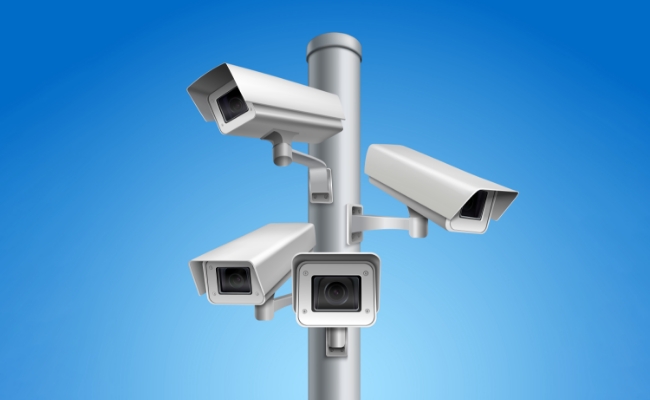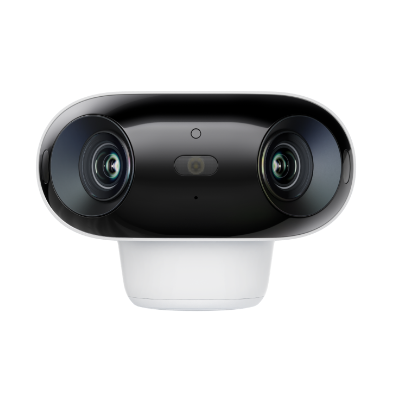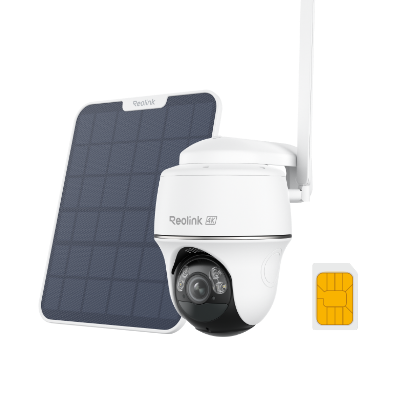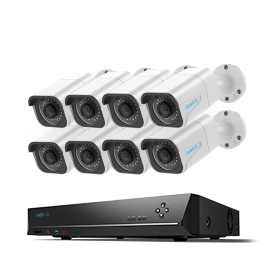Closed-Circuit Security Cameras: The Ultimate Guide for 2026

Closed circuit security cameras, also known as CCTV cameras, are video surveillance cameras used to monitor homes, businesses, public spaces, and so on with a view to ensure better security. In this comprehensive guide, we will talk about closed circuit camera systems, top products in the market, important things to consider when choosing a system, and answer common questions people have about CCTV security.
What Are Closed-Circuit Security Cameras?
Video surveillance systems that monitor a specific area are known as closed circuit television (CCTV) security cameras. Unlike broadcast television systems, closed circuit camera system video feed is not openly transmitted or broadcasted. A closed system is created by the cameras, which connect via cables or wirelessly to monitors and recording devices and is accessible only by authorized users.
Best Closed-Circuit Security Cameras and Systems
With many options on the market, here are some top closed circuit wireless security cameras for home and business use:
- ANNKE 8-Channel 4K - The ANNKE 8-Channel 4K CCTV kit comes with four 5MP super HD outdoor bullet cameras that can record license plate details up to 100 feet away, even at night, with strong night vision.
- Q-See 16-Channel HD - Q-See's expandable system ships with a weatherproof DVR and four 5MP bullet cameras with 100-degree wide viewing angles, infrared night vision up to 100 feet, and IP66 weather resistance.
- Swann 8-Channel 4K - Swann bundles its 4K NVR with four 5MP dome cameras that record quad HD video. True Detect heat and motion sensing helps reduce false alerts, and the free mobile app makes it easy to view feeds remotely.
Best IP CCTV Cameras and Systems
For those seeking IP-based CCTV systems, here are some top options with details on their key features and capabilities:
1. Best Wireless IP Security Camera with 180-Degree View - Argus 4 Pro
The Argus 4 Pro security camera from Reolink offers a remarkably wide 180-degree field of view coverage powered by an integrated rechargeable battery. By using a rounded 1/1.8” CMOS sensor and advanced lens, the camera captures expansive horizons up to 8 megapixels in resolution. It transmits crisp and detailed footage to the Reolink mobile app over WiFi without any wires restricting optimal placement.
Pros:
- Provides expansive 180-degree monitoring coverage without blindspots
- Crisp 8MP video quality for sharp images
- Fully wireless operation for flexible placement anywhere
Cons:
- No free cloud storage plan is offered
4k 180° Wire-free Color Night Vision Camera
4K UHD 180° Blindspot-free View; Color Vision Day and Night; 30% More Battery Life; Dual-band Wi-Fi 6; Smart detection.
2. Best 4K Non-WiFi CCTV Camera - Go PT Ultra
Designed for standalone operation, Reolink’s Go PT Ultra CCTV camera delivers sharp 4K 8MP video and intelligent detection features fully powered by an integrated battery and solar charging system. This wireless camera operates on a 4G cellular network, allowing you to place it anywhere without the need for an internet connection. The Go PT Ultra offers set-and-forget operation for months using just solar power without any external wiring.
Pros:
- Self-contained solar-powered operation without wiring needs
- Sharp and detailed 4K 8MP CCTV video quality
- Intelligent detection avoids excessive false alerts
- 355° panning view minimizes blind spots
Cons:
- No NVR recorder is included with the camera
4K 8MP Wire-Free 4G LTE PT Battery Camera
4K 8MP; Smart Detection; 355° Pan & 140° Tilt; Battery/Solar Powered; Color Night Vision; Smart Real-Time Alert.
3. Best 4K Wired Security Camera System - RLK16-800B8
The RLK16-800B8 delivers sharp 8MP 4K video across all 16 channels for incredibly clear footage. The integrated network video recorder (NVR) removes the need for a separate local storage device to store the data of each 4K camera. Simply connect the recorder to a router via Ethernet to enable remote access from anywhere.
Pros:
- End-to-end 4K 8MP video resolution for all cameras
- 16-channel capacity covers future neeeds
Cons:
- Bulky setup may require professional installation
24/7 Surveillance in 4K Ultra HD
Power over Ethernet; 24/7 Continuous Recording; 16-Channel NVR; 4TB HDD Built-In; Audio Recording; 100ft Night Vision.
What to Consider When Choosing Closed Circuit Camera System for Home
When selecting a closed circuit camera system for home, there are a few key factors to take into account based on your needs:
1. Cables and Connectivity
When setting up, decide if you want a wired or wireless system. CCTV-wired systems have a more stable connection because video cables physically deliver the data to the recorder. However, mounting the cables can be laborious, especially if the cameras are mounted in hard-to-reach locations. Flexible camera placement is possible with wireless systems using WiFi data transmission, but there can be interference from obstructions or distance.
2. Indoor vs. Outdoor Use
Check out CCTV cameras, which will allow monitoring of both inner and outer spaces. Outdoor cameras should be weatherproof, meaning a waterproof casing to prevent infiltration by rain or snow and vandal-resistant design and materials to stop someone intentionally destroying it. They also usually come with infrared night vision up to 100 feet or more, so they can watch even in the dark.
3. Resolution
Such higher resolution camera models like 4K and 5MP offer better images with more details like license plate numbers. Cameras with lower resolution are less expensive, but the footage is grainier, making it difficult to identify people and objects on the recording. The resolution should match how important it is for you to be able to recognize fine details in your monitoring needs.
4. Storage
Most CCTV systems include hard drives (measured in terabytes, or TB) for local recording storage, and some also include cloud storage subscription options for backing up video. Using variables like total cameras, as well as their resolution and the video quality settings you’re using, calculate how long you’ll need to store footage at a given frame per second. This allows you to determine how much storage capacity and how long you will need to review an incident if needed.
5. Expandability
If you believe you might install more security cameras to view other areas in the future, then you can go with a CCTV system that will allow for possible growth. Look for additional open camera channels to plug in more cameras and larger 8 or 16-channel DVRs. Greater storage capacity also allows you to include higher resolution or more cameras in the future.
IP vs. Closed Circuit Home Security Cameras: What's the Difference?
While IP and closed circuit security cameras no WiFi have similarities in capturing video for home security purposes, they differ in a few key ways:
- Connectivity: IP cameras connect to and transmit data over computer networks and internet protocol router technology like WiFi. CCTV cameras instead form a self-contained closed video circuit and do not connect to external networks.
- Video Transmission: Once connected to the network, IP cameras can wirelessly transmit digital video over local WiFi or longer-range wireless mesh networks. CCTV systems require physical video cables running directly between each camera and the recording device in a wired point-to-point setup.
- Remote Access: Because IP cameras stream digital video that can be accessed over the internet, they more easily enable remote access to live and recorded footage via apps and web interfaces. Viewing CCTV system recordings remotely requires specialized equipment like CCTV transceivers or hybrid DVRs.
- Installation: The network connectivity focus of IP cameras reduces installation complexity since only power and networking access are needed. Running video cables from each CCTV camera back to the DVR recorder makes closed-circuit systems far more labor-intensive to implement.
- Scalability: Most WiFi networks and routers can simply be expanded by adding more IP cameras connected to the same network with little additional infrastructure required. Expanding a CCTV system traditionally requires the difficult task of installing longer video runs or additional cabling to support more cameras.
FAQs
What is a closed circuit camera system?
A closed-circuit camera system is a self-contained security camera setup where cameras connect only to a recording device and monitor within the system itself rather than openly broadcasting video streams. The CCTV feeds remain private to authorized viewers rather than transmitting publicly.
Do closed circuit cameras record?
Yes, closed-circuit security cameras record video footage to a digital video recorder (DVR) or network video recorder (NVR) so the video can be stored and reviewed later if a security incident occurs. Many CCTV systems also provide backup recordings via cloud services or external hard drives.
What security system works without electricity?
The majority of wired CCTV cameras run on electricity. However, some wireless battery cameras have built-in solar panels or large battery banks that recharge themselves constantly. It can run for months without wiring or external power, making it possible to install anywhere there’s sunlight.
Conclusion
Today's CCTV systems are smarter and more scalable than ever, with advanced video analytics, expanded capacity, and ample onboard storage. With higher video resolutions and battery/solar capabilities, closed circuit security cameras will remain a mainstay for complete property monitoring and protection as the technology improves.
Search
Subscribe for the Latest Updates
Security insights & offers right into your inbox



